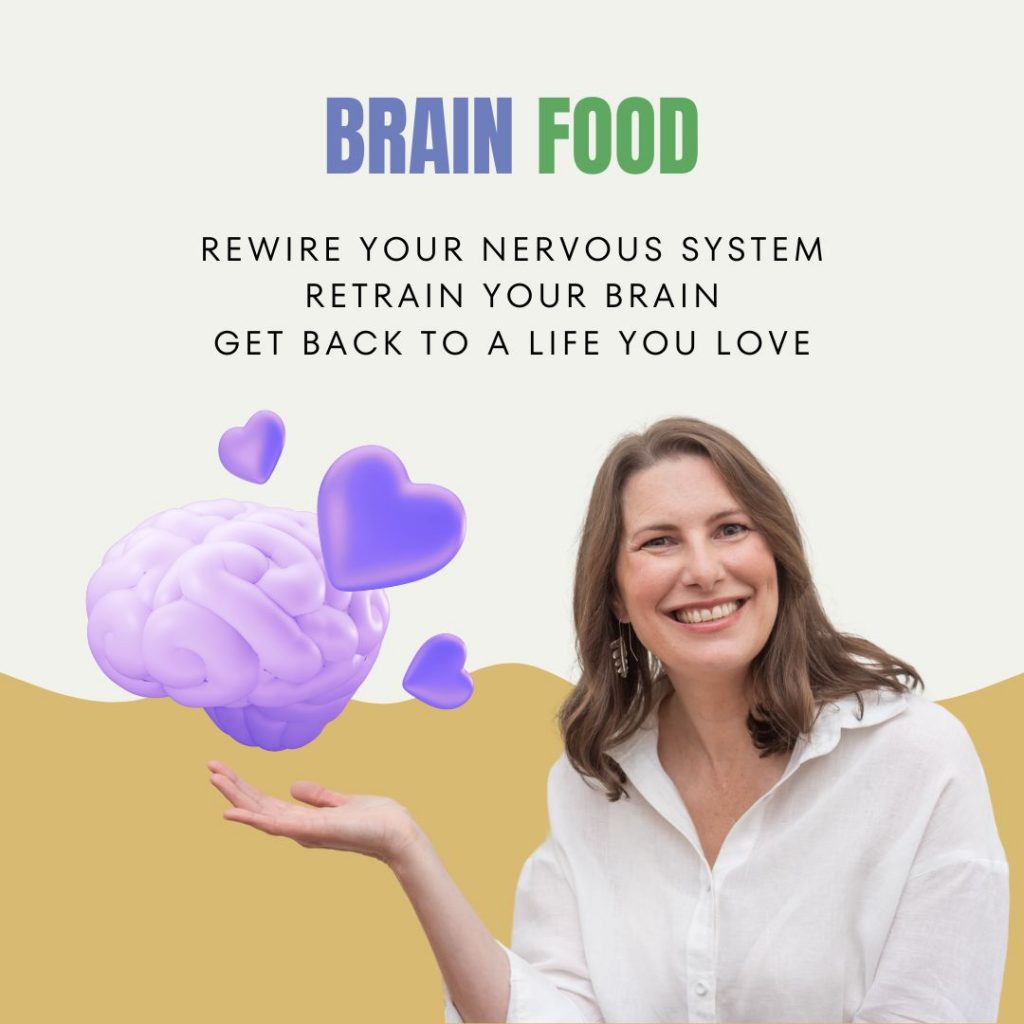Are you experiencing the symptoms of histamine intolerance along with anxiety? Ever wondered if anxiety and histamine connected?
Surprisingly, there is a link between the two. Which many people are not aware of. I find a lot of my clients have anxiety, yet aren’t familiar with this link between histamine intolerance or Mast Cell Activation Syndrome (MCAS) and their anxiety. Let’s have a look at histamine intolerance, anxiety, and the relationship between the two.
What is histamine intolerance?
Let’s briefly touch on what histamine intolerance is. Histamine intolerance is a condition characterized by reactions when individuals consume foods or substances high in histamine or that trigger histamine release in the body. In this condition, the body’s ability to break down and metabolize histamine is compromised, leading to an accumulation of histamine in the bloodstream.
The analogy of a bucket, also known as the ‘histamine bucket” is often used. As the “bucket” fills up, symptoms can present when the bucket overflows. You can learn more about the histamine bucket concept in my article on Histamine and Stress
Here’s a recap of the most common histamine symptoms:
Histamine Intolerance Symptoms:
Gastrointestinal Symptoms:
- Abdominal pain
- Bloating
- Diarrhea
- Nausea
- Vomiting
- Heartburn/reflux
- Constipation
Skin Reactions:
- Hives
- Itching
- Rashes
- Eczema
- Flushing of the skin
Respiratory Symptoms:
- Sneezing
- Sinus congestion
- Runny nose
- Asthma-like symptoms
Pain:
- Headaches
- Migraines
- Muscle pain
- Joint pain
- Nerve pain
Cardiovascular Symptoms:
- Rapid heartbeat (tachycardia)
- Low blood pressure
- Poor temperature regulation
Fatigue and Sleep Disturbances:
- Fatigue
- Difficulty sleeping
- Insomnia
- Nighttime hot flashes
Neurological Symptoms:
- Brain fog
- Difficulty concentrating
- Anxiety
- Dizziness
For a more in-depth exploration of histamine intolerance, you can refer to my blog, What is histamine intolerance?
What is anxiety?
Anxiety is a complex and multifaceted mental health condition characterized by feelings of excessive worry, fear, or unease. It is a normal response to stress or perceived threats, but in individuals with anxiety disorders, these feelings can be intense, persistent, and disproportionate to the actual situation.
What is the connection between anxiety and histamine intolerance?
There are multiple factors that connect anxiety and histamine. Neurotransmitters, the gut microbiome and stress. So how do they impact anxiety?
Let’s talk about neurotransmitters:
What is a neurotransmitter? A neurotransmitter is a chemical messenger that transmits signals in the brain and other areas of the nervous system. These chemical substances play a crucial role in communication between nerve cells, or neurons, and are fundamental to the functioning of the nervous system.
Some well-known neurotransmitters include:
Dopamine: Involved in reward and pleasure, as well as motor control and mood regulation.
Serotonin: Plays a role in mood regulation, appetite, and sleep.
GABA (Gamma-Aminobutyric Acid): Main inhibitory neurotransmitter, promoting relaxation and reducing neural excitability.
Glutamate: Main excitatory neurotransmitter, involved in learning and memory.
Acetylcholine: Involved in muscle contraction, learning, and memory.
Norepinephrine (Noradrenaline): Involved in the “fight or flight” response and mood regulation.
Moreover, neurotransmitters are tightly regulated to maintain a balance in the nervous system. Imbalances in neurotransmitter levels or disruptions in their functioning are associated with various neurological and psychiatric conditions, including anxiety disorders, depression, and schizophrenia.
Histamine is also a neurotransmitter. It works to control the sleep-wake cycle.
However, excessive histamine levels can disrupt the delicate balance of neurotransmitters in the brain, potentially giving rise to anxiety-related symptoms. Restlessness, nervousness, difficulties in concentration, and, in severe cases, panic attacks may be linked to the influence of histamine on the central nervous system.
Anxiety or Histamine Intolerance?
Which comes first? Histamine intolerance or anxiety? Sometimes it can be hard to tell and this becomes challenging for those who suffer from the symptoms of both. You see, there is a bidirectional relationship between histamine intolerance and anxiety. On one hand, individuals with pre-existing anxiety disorders may be more susceptible to histamine intolerance due to the intricate communication between the gut and the brain. On the other hand, histamine intolerance can exacerbate anxiety symptoms or even contribute to the onset of anxiety in those predisposed to such conditions. To read more about the gut-brain axis, check out this blog, Food, Mood and the Gut Microbiome.
Stress as a driver:
Meanwhile, the relationship between histamine intolerance and anxiety is intricate, with stress playing a pivotal role in disrupting the delicate balance of the gut microbiome. The gut and brain are linked and stress has been demonstrated to instigate changes in the gut. Including an increase in opportunistic bacteria, the onset of leaky gut, heightened intestinal pain, altered intestinal motility, and a suppression of SIgA levels, thereby elevating the risk of food allergies, bacterial overgrowth, and yeast overgrowth.
Research indicates that a disturbed gut microbiome, may present with an array of symptoms including anxiety. The gut is recognized for producing neurotransmitters influencing moods and emotions. The gut notably produces over 90% of the neurotransmitters; serotonin and more than 50% of dopamine.
How does serotonin and dopamine affect anxiety?
Serotonin and dopamine are two neurotransmitters. These chemical messengers in the brain play crucial roles in regulating mood, emotions, and various physiological functions. While both neurotransmitters are involved in complex neural circuits, their interactions and dysregulation can contribute to anxiety.
Serotonin:
Role in Anxiety: Serotonin, often referred to as the “feel-good” neurotransmitter, is involved in mood stabilization and the regulation of anxiety. Imbalances in serotonin levels have been linked to various anxiety disorders.
Connection to Anxiety Disorders: Low levels of serotonin are commonly associated with conditions such as generalized anxiety disorder (GAD), social anxiety disorder, and panic disorder. The exact relationship between serotonin and anxiety is intricate, and it is believed that inadequate serotonin levels may contribute to heightened anxiety.
Dopamine:
Role in Anxiety: Dopamine is involved in the brain’s reward system and plays a role in motivation, pleasure, and reinforcement of certain behaviours. Dysregulation of dopamine levels can influence anxiety, as well.
Connection to Anxiety Disorders: High levels of dopamine or an imbalance in the dopamine system have been implicated in anxiety disorders. Excessive dopamine activity may contribute to heightened sensitivity to stressors and an increased risk of developing anxiety-related conditions.
Interplay Between Serotonin and Dopamine:
While serotonin and dopamine are distinct neurotransmitters, their activities are interconnected. Imbalances in one system can influence the other, contributing to mood disorders, including anxiety.
Add onto this the connection with histamine and the interplay becomes even more complex.
- Stress stimulates mast cells to produce histamine in the body
- Stress exacerbates and upsets the gut microbiome
- An imbalance or dysbiosis of the gut microbiome affects the gut-brain axis as well as neurotransmitters and therefore anxiety.
- Individuals with leaky gut syndrome often experience heightened histamine levels in the brain, leading to a range of symptoms, including anxiety, depression, irritability, and sensitivity to various stimuli. This condition can also trigger systemic chronic inflammation and neuroinflammation.
While traditional views attribute anxiety and depression to imbalances in neurotransmitters like GABA, serotonin, and dopamine, emerging research suggests a role for histamine in these mental health conditions. Excessive histamine in the brain is now considered a potential factor in anxiety, panic attacks, addictive behaviours, and degenerative diseases such as Parkinson’s and multiple sclerosis. Histamine’s influence extends to other mood-altering neurotransmitters, emphasizing its role in shaping emotional well-being.
So what can you do to help anxiety and histamine intolerance?
Supportive foods, supplementation and lifestyle practices can help to lower anxiety. Eating a low histamine whole food unprocessed diet with plenty of protein and leafy green vegetables is a good start! Supplements such as B vitamins, vitamin D, Omega 3 and magnesium are all supportive for the nervous system and mood. Using the right forms of these nutrients for the individual and correcting any nutritional deficiencies is also important. It can also be useful to test the gut and improve gut health to get a robust gut microbiome to support your mood, and check to see if mould or candida are impacting your nervous system.
Underpinning all of this work is creating a healthy regulated nervous system. Many lifestyle tools can help to regulate dopamine and serotonin and calm mast cells – which can then improve your mood, increase tolerance to histamine foods and improve gut health. Exercise and nervous system tools such as meditation, hypnosis, yoga, chi gong, breathing techniques, vagus nerve tools, emotional regulation tools and brain retraining are all great options to try – I include all of these in the Happy Without Histamine Method program and BrainFood course.
Histamine and many processes in the body can contribute to anxiety but this does not mean you have to be stuck with it! If you have anxiety alongside your histamine intolerance symptoms then it might be worth exploring the suggestions mentioned in this blog. It is all interconnected and one of the reasons why a holistic approach to managing histamine intolerance and anxiety is the best option which can give longer-term results and resolution of both these issues.

Stuck dealing with confusing, frustrating and chronic symptoms and can’t seem to figure out why?
Join BrainFood and learn how to use the latest Neuroscience to help your body heal.
Use easy tools to reduce symptoms, calm anxiety, improve sleep, increase tolerance to foods and activities and get better results from treatments.

 Mast Cells and Hypermobility: The Elastase Connection
Mast Cells and Hypermobility: The Elastase Connection
It’s my first time on your blog, and I have to admit that I’m amazed at how much research you did to produce such a fantastic post.